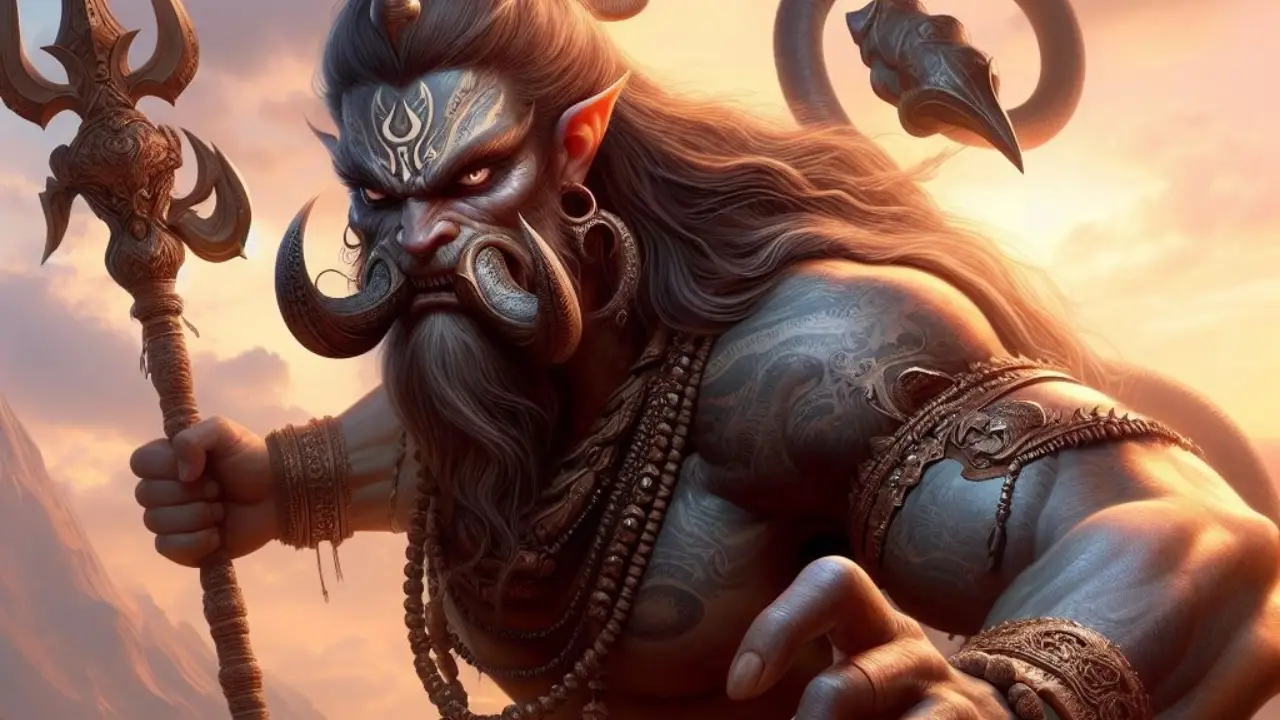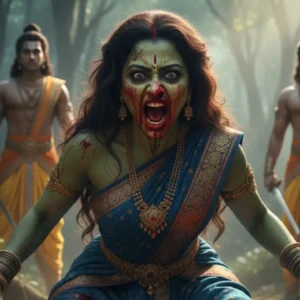Legends often weave intricate narratives of valor, love, and cosmic battles, echoing through the corridors of time. Among these tales lies the myth of Jalandhar, a demon whose audacity dared to challenge the might of none other than Lord Shiva himself. This ancient legend is steeped in mystique and fervor. It unveils profound insights into the eternal struggle between good and evil, the complexities of love, and the indomitable spirit of defiance.
The Genesis of Conflict:
In the annals of Hindu mythology, Jalandhar emerges as a formidable figure. He was born out of the cosmic churning of the ocean, known as the Samudra Manthan. With the elixir of immortality coursing through his veins, Jalandhar rose to prominence as the ruler of demons. He established his dominion over the netherworld with an iron fist. Yet, amidst his reign of darkness, a flicker of light ignited an unforeseen turn of events.
The Love That Defied All Odds:
Central to the tale of Jalandhar is the profound love shared between him and Vrinda, a virtuous woman of unparalleled beauty and purity. Their love transcended boundaries, weaving a tapestry of devotion and passion that echoed through the heavens. However, fate’s cruel hand intervened when Lord Vishnu, assuming Jalandhar’s form, violated the sanctity of their bond, leaving Vrinda shattered and bereft.
The Divine Confrontation:
Fueled by righteous indignation and blinded by vengeance, Jalandhar embarked on a path of defiance. He challenged the very foundations of the cosmos. His audacious ambition led him to confront Lord Shiva himself, the supreme deity of destruction and regeneration. In a battle that shook the heavens and the earth alike. Jalandhar unleashed his formidable powers, determined to dethrone the divine.
The Triumph of Virtue:
Yet, in the face of Jalandhar’s relentless onslaught, Lord Shiva remained resolute, embodying the essence of cosmic equilibrium and righteousness. With his divine prowess and unwavering resolve, Shiva confronted Jalandhar, revealing the futility of his misguided endeavors. In a moment of divine reckoning, truth triumphed over darkness. Jalandhar met his inevitable demise, vanquished by the indomitable spirit of righteousness.
Reflections on the Myth:
The myth of Jalandhar resonates with timeless truths and profound wisdom, offering insights into the intricacies of human nature and the eternal struggle between good and evil. It serves as a poignant reminder of the consequences of hubris and the enduring power of virtue to prevail over adversity.
The Complexity of Morality:
Within the myth of Jalandhar lies a nuanced exploration of morality and the shades of gray that define human nature. While Jalandhar is depicted as a demon, his love for Vrinda humanizes him, blurring the lines between good and evil. This complexity challenges traditional notions of morality, prompting readers to ponder the intricacies of right and wrong, and the potential for redemption even in the darkest of souls.
The Power of Devotion:
At the heart of the myth lies the unwavering devotion of Vrinda. Her purity and steadfastness serve as a beacon of hope amidst chaos and turmoil. Her sacrifice and resilience underscore the transformative power of love and devotion. It inspires readers to cultivate similar virtues in their own lives. Through Vrinda’s character, the myth extols the virtues of loyalty, sacrifice, and unwavering faith. It invites readers to reflect on the profound impact of devotion in shaping destinies.
The Lessons of Hubris:
Jalandhar’s downfall serves as a cautionary tale against the dangers of hubris and unchecked ambition. His relentless pursuit of power and defiance of divine authority ultimately lead to his demise. This highlights the inevitable consequences of arrogance and pride. This theme resonates deeply with readers, reminding them of the importance of humility and self-awareness in navigating life’s challenges and temptations.
The Symbolism of Cosmic Balance:
In the epic battle between Jalandhar and Lord Shiva, we witness the eternal struggle between opposing forces and the delicate balance that governs the universe. Lord Shiva, as the embodiment of destruction and regeneration, represents the cyclical nature of existence. Jalandhar symbolizes the disruptive forces that threaten to disrupt this delicate equilibrium. Through their conflict, the myth underscores the importance of maintaining balance and harmony in both the cosmic and personal spheres of life.
The Relevance in Modern Times:
Despite its ancient origins, the myth of Jalandhar remains strikingly relevant in today’s world. It offers timeless lessons that resonate across cultures and generations. In an era marked by strife and discord, the myth reminds us of the enduring power of love, virtue, and righteousness to overcome adversity and transcend the boundaries of time and space. Its universal themes speak to the inherent human desire for meaning, connection, and spiritual fulfillment. It serves as a source of inspiration and guidance in navigating the complexities of modern life.
The Myth as Allegory:
Beyond its literal interpretation, the myth of Jalandhar can be viewed as an allegory for the human condition. Each character represents facets of the psyche and the collective consciousness. Jalandhar embodies the egoic mind, driven by desires and impulses. Lord Shiva symbolizes the transcendent Self, grounded in wisdom and spiritual realization. Vrinda, in turn, represents the soul’s longing for union with the divine, serving as a catalyst for transformation and self-discovery. Through this lens, the myth takes on deeper layers of meaning. It invites readers to explore the depths of their own psyche and spiritual journey.
The Evolution of Myth:
As with all myths, the legend of Jalandhar has evolved over time, adapting to the cultural and social contexts in which it is told. Variations of the myth can be found across different regions and religious traditions. Each adds unique nuances and interpretations to the original narrative. This fluidity speaks to the dynamic nature of mythology and its ability to reflect and shape the collective consciousness of humanity.
Expanding the Narrative:
Beyond the central characters of Jalandhar, Vrinda, and Lord Shiva, the myth offers fertile ground for exploring additional themes and subplots. From the cosmic consequences of Jalandhar’s actions to the moral dilemmas faced by ancillary characters, such as the gods and goddesses caught in the crossfire, there are myriad avenues for expanding the narrative and delving deeper into its rich tapestry of symbolism and allegory.
The Legacy of Myth:
In conclusion, the myth of Jalandhar endures as a timeless testament to the power of storytelling and the enduring human quest for meaning and transcendence. Through its captivating narrative and profound themes, it continues to captivate and inspire readers across cultures and generations. It reminds us of the eternal struggle between light and darkness, and the transformative power of love, virtue, and righteousness in shaping the destiny of humanity.
What are your thoughts on the myth of Jalandhar? Share your insights and reflections in the comments below and join the conversation.





